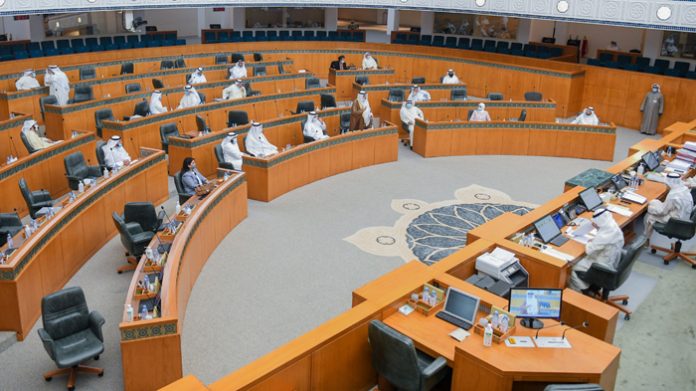A contentious draft public debt law that would allow the government to borrow on international debt markets has continued to meet with stiff opposition from lawmakers.
The debt law, which the authorities consider critical to overcome budget and fiscal deficits arising from low oil revenues, as well as to overcome the economic exigencies caused by the recent COVID-19 pandemic, has been languishing in parliament since 2018. Last month the government submitted a revised draft of the bill for approval to the National Assembly’s finance and economic panel.
However, it is very likely that the new bill could face the same fate as previous attempts with lawmakers remaining unconvinced about its need and on how the government plans to spend the borrowed money. The Head of Parliament’s Finance and Economic panel, Safa Al-Hashem, has already raised objections to the bill and reiterated criticism of the government for not outlining investment plans and failing to diversify state revenues away from oil. “Let me tell you from now that the general tendency [in parliament] is to reject it, because until now, you haven’t been able to convince everybody, including the people,” Al-Hashem is reported to have said.
Without approval for the bill, the government is faced with very few options to tide over its liquidity needs and reduce deficits. Kuwait recently suffered a blow to its sovereign rating when S&P Global Ratings lowered its outlook from a stable AA- to a negative sovereign score. Citing “risks stemming from fiscal pressure” and forecasting the budget deficit to widen to 40 percent of GDP this fiscal year, S&P said that the government’s General Reserve Fund (GRF), which is the main source of budget financing, would not be enough to cover the fiscal shortfall.
Well-placed sources in the finance ministry confirm that over the years the government has been drawing down from the GRF to tide over concurrent budget deficits. In the last six years until fiscal year 2019/2020 the government is reported to have withdrawn as much as KD48 billion from the GRF. According to sources, the fund has dwindled to such an extent that it can no longer shore-up budget deficits let alone meet liquidity crunches the government faces..
In response to the downgrade by S&P, Kuwait’s Finance Minister Barak Al-Sheetan said that the future outlook by the agency “is an automatic result of low liquidity in state reserves.” He added, “The executive and legislative powers are now working on finding solutions for this challenge and the government is looking forward to the cooperation of lawmakers.”
The fall in oil revenues since the precipitous price dip in mid-2014, and which persisted in a ‘lower-for-longer’ scenario until well into 2016, led to recurring budget and fiscal deficits that the government was able to smooth- over by dipping into the GRF. In 2017, faced with a continued deficit budget and falling oil revenue, the government successfully approached the international debt market with a dual tranche sovereign bond offering for a total of US$8 billion. The offering was oversubscribed and received orders of around $20 billion. However, since October 2017, when the provision for borrowing on international markets ran out, the government has struggled to gain approval from parliament for an amended public debt law.
With very few options on the table the government could struggle to provide much-needed support to the market as it tries to claw its way up from the economic repercussions of the COVID-19 pandemic. In mid-March, at the first signs that COVID-19 pandemic would impact Kuwait’s economy, the government along with the Central Bank and other local banks announced a slew of measures aimed at bolstering the market and stimulating the economy.
With uncharacteristic alacrity, Kuwait’s cabinet approved a draft law authorizing KD500 million additional budget funding to ministries and state agencies for the fiscal year 2020/2021. The Central Bank followed suit by reducing the repo rate to a historic low of 1.5 percent and the Kuwait Banking Association announced a moratorium on bank loans. Small and medium entrepreneurs as well as retail clients of local banks, both citizens and expatriates, were granted a freeze on loan repayments, including a waiver of interest and late-payment charges, for a period of up to six months.
Despite the support, the latest monthly review on the health of markets in the region by the Kuwait Financial Centre showed that in July, despite the easing of lockdown and recent positive trends seen in most markets of the six-nation Gulf Cooperation Council (GCC) bloc, Kuwait continued to remain in negative territory, with the Kuwait All Share index registering a decline of 3.2 percent for the month. The earnings numbers released so far also added to the negative sentiment. During the first-half of 2020, two of Kuwait’s biggest companies, National Bank of Kuwait and Zain registered a decline in net profit by 46.9 percent year-on-year (y/y) and 14 percent y/y respectively decline.
With oil prices, which form the mainstay of Kuwait’s economy, still remaining sluggishly low the government’s ability to further support the market remains severely constrained. Though oil prices at the end of July 2020 were up 5.2 percent from a month earlier and stood at US43.3 per barrel, this is nowhere close to what Kuwait needs to balance its budget and sustain the economy. The passing of a public debt law would give the government a much-needed breathing space, but lawmakers apparently do not think so.
– Copyright: The Times Kuwait

















